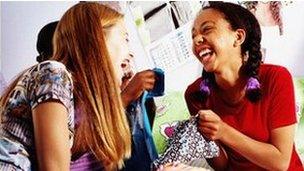Marriage no longer a key goal for girls, survey suggests
- Published

Girls no longer see marriage as an key definition of success a survey suggests
Girls are increasingly ambivalent about marriage while most boys see it as something to aspire to, suggests a poll for the Girl Guides.
Some 46% of girls agree marriage is the best form of relationship against 56% of boys, according to the study.
The Girls' Attitudes Survey polled 600 boys and 1,200 girls aged seven to 21.
Chief Guide Gill Slocombe said: "Girls still value family and marriage but, they clearly do not see this as the absolute definition of success."
The survey indicates that in 2012 girls are more likely to define success as being confident and independent (56%) rather than being married (21%). The figures also suggest girls are generally positive about marriage but many are open minded about whether it is the best or only option.
More than two thirds (69%) of the girls agreed that some types of families were treated less fairly, such as single parents and same-sex parents or parents who were not married.
Loving marriage
Most, (72%) disagreed with the suggestion that marriage was just another piece of paper and more than three quarters (76%) disagreed with the idea that it was better not to get married at all - and almost half (46%) agreed that married couples divorced too quickly without trying to make it work.
The annual Girls' Attitudes Survey has canvassed the opinions of a representative sample of girls and young women throughout the UK since 2009. The sample is not confined to Guides.
Boys are included in this year's survey for the first time as a point of comparison over gender issues. The survey reveals differing attitudes between the sexes on family and parenting issues and on how gender will affect other aspects of their lives.
Some 47% of the boys agreed that married couples made better parents than unmarried couples, compared with 32% of girls.
Most of the girls (85%) and boys (82%) agreed that parenting should be shared equally between parents.
In terms of employment, the girls had a more optimistic outlook than the boys. Only 19% of the girls believed their career prospects were worse than those of their mothers, while 38% of the boys said they expected to be less successful than their fathers - but one in five of the girls aged 11 to 21 thought women were treated less fairly by employers.
Two in three of the girls aged 11 to 21 (69%) believed education was the top freedom worth fighting for, as opposed to the right to vote - picked by only 9% as a cause.
The boys were more likely (78%) to say they were happy with their looks than the girls (68%) were, with one in three of the girls willing to consider cosmetic surgery.
Some 69% of the girls believed women were judged more on appearance than skills - a figure that rose to 75% among those in work.
Almost half of those aged between 11 and 21 felt that women who worked in the caring professions or focussed on motherhood were undervalued by society.
Ms Slocombe said: "Young women today have strong opinions, and some of those are very different from the boys'. They believe they have it better than their mothers' generation and they prize their independence and education.
"They value confidence, so it is a great shame that despite this they feel they are judged on their looks and believe that society wouldn't value them if they focus on motherhood or work in a caring profession."
Caroline Cartmill, 15, a Guide, said: "Like many other girls, I value my education and the opportunities it presents to me.
"I believe successful careers, thriving families and a positive lifestyle are all feasible to women of today. Girls can have an independent outlook and recognise the alternatives to the traditional family structure."
- Published11 May 2012
- Published4 August 2010